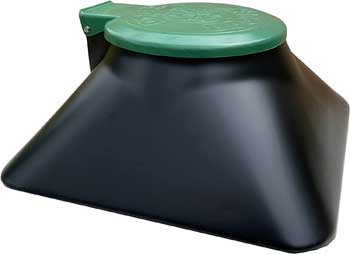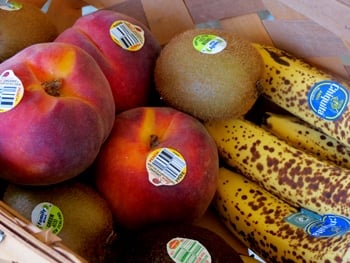There are at least 100 things in your home that you can compost, which will greatly reduce the amount of trash you put out every week to go to the landfill. But even though technically you can compost anything that was once living, some things are better left out of the compost pile for the sake of better compost and less hassle.
Here are 10 of them…
1. Dog and Cat Poop

Horse, cow, chicken and rabbit droppings are great additions to your compost pile. They will add nutrients and organic matter that will benefit your soil. However, it is not advisable to add the poop from dogs and cats (and other carnivores) to your compost. Their waste often contains microorganisms and parasites that you do not want to introduce to the crops you will be eating.
If you do want to compost your dog and cat poop, you must process them separately from your regular compost pile (there are special composters just for pet waste), and only use the resulting compost on non-food crops.
2. Tea and Coffee Bags
Coffee grounds and tea leaves definitely belong in a compost pile. They provide generous amounts of nitrogen, phosphorous and potassium, which are elements that are essential to plants. However, coffee grounds and tea leaves should only be added to compost if they are bag-less, or have been removed from their bags.
The bags that some coffee and tea products come in contain nylon and other synthetic fibers that do not break down in a compost pile, and contain plastic particles and chemicals you don’t want in your morning beverage, much less your soil.
Don’t compost tea or coffee bags unless you are certain they are made from natural materials, like cotton or hemp.
3. Citrus Peels and Onions
While fruit and vegetables scraps from the kitchen are fundamental ingredients in a home compost pile, there are two iffy exceptions: citrus peel and onions.
“What?!” you say? Unfortunately, the natural chemicals and acidity in citrus peels and onions can kill worms and other microorganisms, which can slow down the decomposition in your pile. Plus, unless you chop them into tiny bits, citrus peels take forever to break down, which will delay how soon you can use your compost.
If you only occasionally throw citrus peels and onion scraps into your compost bin, it’s no big deal, but if you vermicompost or have worm bins (which is an amazingly convenient and odor-free way to compost if you are in an apartment), then citrus peels, onions and garlic scraps are a no-no, because they will harm your worms.
(Personally, I usually put my onion scraps into the freezer to use when I make stock, and use citrus peels to make non-toxic DIY house cleaning sprays instead.)
4. Fish and Meat Scraps
While technically they will decompose just fine, you really don’t want to add fish and meat scraps to the compost pile. Fish and meat are organic and will add nutrients to your garden, but unfortunately their smell will act like a magnet for any rats, mice, foxes, raccoons, or cats in the neighborhood (or even coyotes and bears, depending on where you live), who will ransack the compost to eat them.
The stink of rotting meat and fish could also really annoy you and your neighbors, too!
5. Glossy or Coated Paper
Many paper products are potential compost fodder, especially soy-ink newspapers, old paper towels and tissues and even shredded cardboard. They are from trees, after all!
However, paper that has been treated with plastic-like coatings to make it bright, colorful and glossy, like magazines, won’t decompose properly, contains toxins, and is not appropriate for your compost pile.
6. Sticky Labels on Fruits and Vegetables

Those obnoxious little sticky labels and price tags on fruit and vegetables are made of “food-grade” plastic or vinyl, and do not biodegrade. (See Glossy Paper, above.) They are also easy to miss, which means they often end up trashing up your compost piles.
Municipal composters can’t handle them, either. In fact, at least one waste management company says PLU produce stickers are their biggest source of compost contamination.
Try to remove these stickers from fruit and veggie scraps before you put them in the compost pile.
7. Coal Fire Ash
The ash from coal fires or charcoal-briquet fires should not be added to your compost pile, as it contains so much sulfur as to make the soil excessively acidic, which will harm your plants. Also, many charcoal briquets are treated with chemicals you really don’t want in your compost, your garden or your food.
Wood fire ash from the fireplace can be added in moderation, but please put the coal and charcoal-briquet ash in the trash bin.
8. Sawdust From Treated Wood
While sawdust from untreated, natural woods can be a great addition to compost in moderation, if the wood has been treated with any kind of pressure treatment, varnish, stain or paint, you should never add the sawdust to your compost pile.
These toxic compounds won’t break down in the composting process and can get into the soil, negatively affecting microorganism activity and plant health. The sawdust from pressure treated wood alone contains arsenic and cadmium—two toxins you definitely don’t want in your garden or your food!
Sawdust from treated wood also takes a very long time to break down because it is protected from decay by the chemicals put on it, which will delay how soon you can use your compost on the garden.
9. Large Branches

Large branches take forever to break down and will greatly delay your ability to use your compost in the garden. It may be a little extra work to cut down or chip your branches for the compost pile, but the smaller the pieces you add to your compost, the faster they will break down.
Alternatively, you can start a branch pile at the back of your lot, where you simply pile branches and let them rot over the course of a couple of years. Branch piles also make great habitat for small creatures and snakes too, so be aware of your local fauna before you start one.
10. Synthetic Fertilizer
Synthetic fertilizers (like the blue Miracle stuff) introduce high levels of inorganic elements into the garden ecosystem. Like taking a generic multivitamin instead of eating real, whole food, the form in which these synthetic fertilizers provide nutrients to the soil can actually kill the microorganisms in your compost and your soil, which will ultimately affect the health of your plants.
Compounds in synthetic fertilizers, such as heavy metals, will also leach through the soil into the water table, as well as upset the natural balance of nutrients in the soil and increase salinity.
Stick to natural ingredients for your compost pile.
Image: franz pfluegl/iStock/Getty Images
This article contains affiliate links. As an Amazon Associate I earn from qualifying purchases.









